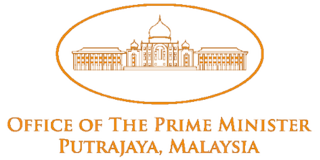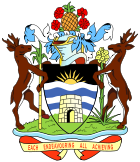
The politics of Antigua and Barbuda takes place in a framework of a unitary parliamentary representative democratic monarchy, wherein the sovereign of Antigua and Barbuda is the head of state, appointing a governor-general to act as vice-regal representative in the nation. A prime minister is appointed by the governor-general as the head of government, and of a multi-party system; the prime minister advises the governor-general on the appointment of a Council of Ministers. Executive power is exercised by the government. Legislative power is vested in both the government and the two chambers of the Parliament. The bicameral Parliament consists of the Senate and the House of Representatives.

The Westminster system or Westminster model is a type of parliamentary government that incorporates a series of procedures for operating a legislature, first developed in England. Key aspects of the system include an executive branch made up of members of the legislature, and that is responsible to the legislature; the presence of parliamentary opposition parties; and a ceremonial head of state who is different from the head of government. The term comes from the Palace of Westminster, the current seat of the Parliament of the United Kingdom. The Westminster system is often contrasted with the presidential system that originated in the United States, or with the semi-presidential system, based on the government of France.
In a parliamentary or semi-presidential system of government, a reserve power, also known as discretionary power, is a power that may be exercised by the head of state without the approval of another branch or part of the government. Unlike in a presidential system of government, the head of state is generally constrained by the cabinet or the legislature in a parliamentary system, and most reserve powers are usable only in certain exceptional circumstances.

The Executive Council of New Zealand is the full group of "responsible advisers" to the governor-general, who advise on state and constitutional affairs. All government ministers must be appointed as executive councillors before they are appointed as ministers; therefore all members of Cabinet are also executive councillors. The governor-general signs a warrant of appointment for each member of the Executive Council, and separate warrants for each ministerial portfolio.

The governor-general of Antigua and Barbuda is the representative of the monarch of Antigua and Barbuda, currently King Charles III. The official residence of the governor-general is Government House.

The prime minister of Antigua and Barbuda is the head of government of the Antigua and Barbuda. The prime minister of Antigua and Barbuda is appointed by the Governor-General under the terms of the Constitution.
Chapter 7: Executive Government.Chapter 7 of the 1997 Constitution is titled Executive Government. There are five Parts, further subdivided into thirty sections, which set out the organization, functions, and responsibilities of the executive branch of government. Modeled on the Westminster system, Fiji's constitution does not separate the Executive and Legislative branches of government as strictly as do many democracies, but despite considerable overlap, the branches of government are nevertheless constitutionally distinct.

The Prime Minister of Malaysia is the head of government of Malaysia. The prime minister directs the executive branch of the federal government. The Yang di-Pertuan Agong appoints the prime minister as a member of Parliament (MP) who, in his opinion, is most likely to command the confidence of a majority of MPs. This person is usually the leader of the party winning the most seats in a general election.

The president of the Republic of Trinidad and Tobago is the head of state of Trinidad and Tobago and the commander-in-chief of the Trinidad and Tobago Defence Force. The office was established when the country became a republic in 1976, before which the head of state was the Queen of Trinidad and Tobago, Elizabeth II. The last governor-general, Sir Ellis Clarke, was sworn in as the first president on 1 August 1976 under a transitional arrangement. He was formally chosen as president by an electoral college consisting of members of both houses of Parliament on 24 September 1976, which is now celebrated as Republic Day.
Dissolution of a legislative assembly is the mandatory simultaneous resignation of all of its members, in anticipation that a successive legislative assembly will reconvene later with possibly different members. In a democracy, the new assembly is chosen by a general election. Dissolution is distinct on the one hand from abolition of the assembly, and on the other hand from its adjournment or prorogation, or the ending of a legislative session, any of which begins a period of inactivity after which it is anticipated that the same members will reassemble. For example, the "second session of the fifth parliament" could be followed by the "third session of the fifth parliament" after a prorogation, but the "first session of the sixth parliament" after a dissolution.

The Cabinet of Singapore forms the executive branch of the Government of Singapore together with the President. It is led by the Prime Minister who is the head of government. The prime minister is a Member of Parliament (MP) appointed by the president who in the president's judgment is likely to command the confidence of the majority of the Members of Parliament (MPs). The other Ministers in the Cabinet are Members of Parliament appointed by the president acting in accordance with the advice of the prime minister. Ministers are prohibited from holding any office of profit and from actively engaging in any commercial enterprise.

The Parliament of Antigua and Barbuda consists of the King of Antigua and Barbuda, the Senate and the House of Representatives.

The House of Representatives of Antigua and Barbuda is the lower chamber of the country's bicameral parliament. Each of the constituencies created in accordance with section 62 of the Constitution shall elect one representative to the House in a direct election in accordance with the procedures specified by or pursuant to any law, subject to the rules of this Constitution. Unless he is prohibited by law from registration as a voter for the purpose of electing a member of the House, every Commonwealth citizen who is eighteen years of age or older and who meets the requirements relating to residence or domicile in Antigua and Barbuda as prescribed by Parliament is entitled to be registered as such a voter in accordance with the provisions of any law in that regard, and no other person may be registered. Every person who is registered to vote in any constituency shall, unless prohibited from doing so by any law, be entitled to vote in accordance with the provisions of any law in that regard in any election of members of the House in that constituency. Voting is free and must be done by secret ballot in accordance with any rules that Parliament may impose during House member elections.

The Senate is the Upper House of Parliament of Antigua and Barbuda. It consists of 17 members appointed by the Governor General. Ten members are appointed on the advice of the Prime Minister, four on the advice of the Leader of the Opposition, one on the advice of the Barbuda Council, one resident of Barbuda on the advice of the Prime Minister, and one at the Governor General's discretion. Subject to the provisions of Section 30 of the Constitution, any person who at the time of his appointment: is a citizen; is twenty-one years of age or older; has lived in Antigua and Barbuda for the twelve months immediately prior to the date of his appointment; and is able to speak and, unless disabled by blindness or another physical condition, to read the English language with enough proficiency to allow him to take an active part in the proceedings.

The monarchy of Antigua and Barbuda is a system of government in which a hereditary monarch is the sovereign and head of state of Antigua and Barbuda. The current Antiguan and Barbudan monarch and head of state, since 8 September 2022, is King Charles III. As sovereign, he is the personal embodiment of the Crown of Antigua and Barbuda. Although the person of the sovereign is equally shared with 14 other independent countries within the Commonwealth of Nations, each country's monarchy is separate and legally distinct. As a result, the current monarch is officially titled King of Antigua and Barbuda and, in this capacity, he and other members of the Royal Family undertake public and private functions domestically and abroad as representatives of Antigua and Barbuda. However, the King is the only member of the Royal Family with any constitutional role.

Speaker of the House of Representatives of Antigua and Barbuda is the presiding officer in the House of Representatives of Antigua and Barbuda. Prior to conducting any other business, the House must elect a Speaker at its first session following a general election. If the position of Speaker becomes vacant at any point before the next dissolution of Parliament, the House must elect a replacement as soon as is practically possible. The Speaker may be chosen from among House members or from among individuals who are not House members but are eligible to serve in that capacity. Before conducting any other business other than electing the Speaker during the first meeting following a general election, the House shall elect a member to serve as Deputy Speaker. If the position of Deputy Speaker becomes vacant at any point prior to the next dissolution of Parliament, the House shall, as soon as is practically possible, elect another member to fill the vacancy. A minister or parliamentarian cannot be elected as the speaker or deputy speaker of the house by the house. When the position of Speaker is open, the House may not conduct any business.

The Cabinet of Ministers of the Republic of Mauritius is the official council which advises the President of the Republic in the making of major decisions. It is led by the Prime Minister and a total of 23 ministers and the Attorney General, who is considered to be a cabinet member. The constitution of the Republic provides a cabinet under the leadership of the Prime Minister that must be appointed by the President after each general elections.

The president of Barbados is the head of state of Barbados and the commander-in-chief of the Barbados Defence Force. The office was established when the country became a parliamentary republic on 30 November 2021. Before, the head of state was Elizabeth II, Queen of Barbados, who was represented on the island by a governor-general. The first and current president is Sandra Mason, who previously served as the last governor-general.

The Leader of the Opposition, officially the Leader of His Majesty's Opposition, is the leader of the largest political party in the House of Representatives of Antigua and Barbuda that is not in government. The Leader of the Opposition is appointed by the Governor-General of Antigua and Barbuda.
The Supreme Audit Institution of Antigua and Barbuda, co-officially known as the Office of the Director of Audit is the supreme audit institution of Antigua and Barbuda, and as such, assists the Parliament in holding the government accountable in management of the country's finances and operations. The institution describes itself as "an independent, constitutionally established office that exists to serve Parliament."












